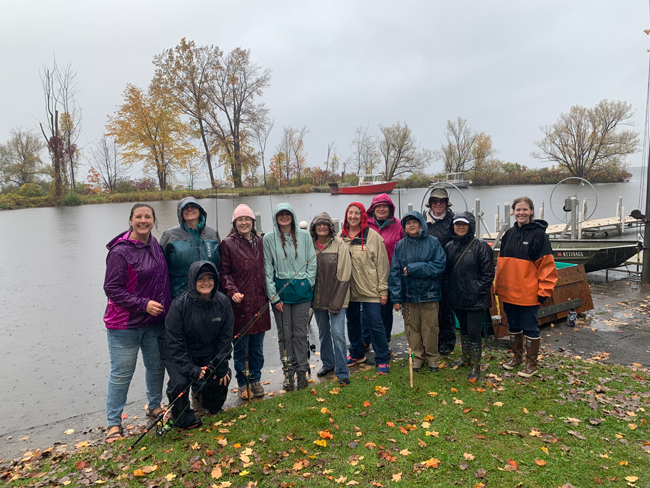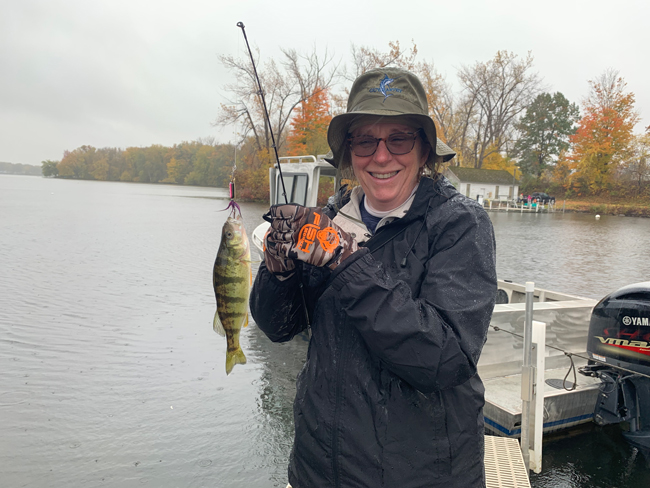
Participants in the Women’s Fishing Seminar on Oneida Lake. Credit: NYSG/J. Cannaday
Contact:
Stacy Furgal, NYSG Great Lakes Fisheries and Ecosystem Health Specialist, E: slf85@cornell.edu, P: (315) 234-1329
John Cannaday, NYSG Great Lakes Recreation and Tourism Specialist, E: jdc378@cornell.edu, P: (315) 849-4436
Oswego, NY, March 25, 2024 - NYSG programming connects anglers with fisheries researchers and science-based angling instructors, increasing their knowledge base to more confidently enjoy NY’s fisheries and to consider fisheries career opportunities.
The angling and fisheries communities within New York’s Great Lakes region have historically been male-dominated, with little representation from minority genders, minority races, and ethnicities. While this trend is decreasing, New York Sea Grant (NYSG) continues to work to create and support programs that increase diversity.
In the autumn of 2023, NYSG worked with the Cornell Biological Field Station on Oneida Lake to offer a women’s fishing seminar focused on walleye. Participants learned the basics of walleye biology and behavior, discussed walleye fishing gear, lures, and techniques; and learned how to tie common fishing knots. Group size was limited to provide individualized instruction during the hands-on angling session.
NYSG additionally partners with the NY Chapter of the American Fisheries Society, and leads a Women in Fisheries mentoring program that is inspiring and empowering people from underrepresented genders to succeed in professional fisheries careers.
As a result of overwhelmingly positive survey data collected from NYSG’s 2022 mentoring and women’s fishing programs, the mentoring program was continued for a second year in 2023, with double the number of participants. Based on feedback from the 2023 programming, plans are being made to host a women’s ice fishing seminar in early 2024.
NYSG is leading several initiatives that focus on fostering diversity in the angling and fisheries communities and encouraging participation by underrepresented populations in both the recreational and career opportunity aspects associated with fisheries.

Participant with yellow perch. Credit: NYSG/J. Cannaday
Project Partners:
• Cornell Biological Field Station on Oneida Lake
• New York State Licensed Fishing Guide Jacqueline McManus
• American Fisheries Society New York Chapter
More Info: New York Sea Grant
New York Sea Grant (NYSG), a cooperative program of Cornell University
and the State University of New York (SUNY), is one of 34 university-based
programs under the National Oceanic and Atmospheric Administration’s
National Sea Grant College Program.
Since 1971, NYSG has represented a statewide network of integrated
research, education and extension services promoting coastal community
economic vitality, environmental sustainability and citizen awareness
and understanding about the State’s marine and Great Lakes resources.
Through NYSG’s efforts, the combined talents of university scientists
and extension specialists help develop and transfer science-based
information to many coastal user groups—businesses and industries,
federal, state and local government decision-makers and agency managers,
educators, the media and the interested public.
The program maintains Great Lakes offices at Cornell University, SUNY
Buffalo, Rochester Institute of Technology, SUNY Oswego, the Wayne County Cooperative Extension office
in Newark, and in Watertown. In the State's marine waters, NYSG has offices at Stony Brook
University and with Cornell Cooperative Extension of Nassau County on Long Island, in Queens, at Brooklyn College, with Cornell Cooperative
Extension in NYC, in Bronx, with Cornell Cooperative Extension of Ulster County in Kingston, and with Cornell Cooperative Extension of Westchester County in Elmsford.
For updates on Sea Grant activities: www.nyseagrant.org has Facebook, Twitter/X, Instagram, and YouTube links. NYSG offers a free e-list sign up via www.nyseagrant.org/nycoastlines for its flagship publication, NY Coastlines/Currents, which is published quarterly.